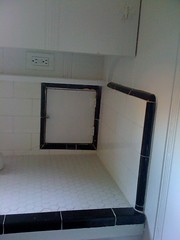Do you know about milk doors? The two houses my parents have
owned were both built in the 1940s, when milk doors often were part of the
house’s design. My parents’ two houses each had a milk door. The first house
was where I spent my childhood and I was the kind of kid who always noticed
unusual things like a tiny door positioned near our side door. The tiny door
was metal, and approximately 12 inches tall by 5 or 6 inches wide. Just the
right scale for my Barbie doll. What magic! When you’re little, anything
that is small in scale is automatically fascinating. This door intrigued me. It
seemed full of potential: doll door, secret passageway, tiny peek-hole to the
outside world. It was right in line with so many other small-scale things on my
radar: Alice in Wonderland’s ability to shrink and then grow, tiny fairies in books,
Thumbelina, the Borrowers, my dollhouse.
This morning I was thinking about milk doors. I was pouring
the last few cups of milk from a gallon bottle into two glass mason jars. (You know
your fridge is full of leftovers, lunchboxes and who-knows-what-else when you
transfer milk to mason jars because the gallon jug won’t fit!) I announced
to my kids that milk used to be delivered in glass bottles to people’s homes.
Today I looked for photos of milk doors online. A website
I’d seen before (retrorenovation.com) had a post about milk doors, which led me
to a piece online about home milk delivery, which existed roughly from 1860 to 1960.
This is the post that gave me some more background: www.www.historicnewengland.org/collections-archives-exhibitions/online-exhibtions/From_Diary_to_Doorstep/index.html )
The photo below reminds me of the milk doors in my parents' houses. It's not exactly the same, but the shape is similar. It brings back such a happy memory...
(Photo courtesy of GoldTrout.)
The photo below shows how this milk door is built right into the kitchen's design.
The hexagonal counter tile is original, and the whole effect is charming!

(Photo courtesy of TurquoiseBird.)
This photo below shows a delivery truck and the milkman who drove it. Today Alpenrose Diary is the only existing dairy farm near
Portland, Oregon. It was founded in 1916 by the Cadonau family, and by 1918 they
saw the potential of delivering milk to residential customers. The family
bought a used Ford touring car and converted it into a delivery truck. The
business grew and grew. Today there are five generations of the Cadonau family
involved in the dairy.
(Alpenrose Dairy truck. Photo courtesy of milkmen.com)
By the time my parents bought their first house it was the mid-1970s. Milk was no longer delivered to the neighborhood, but the milk door remained. I was a young child in the ‘70s, used to modern-day supermarkets with their walls of fresh milk. It was odd to imagine a time when delivery to your home was the standard way of getting milk.
Online there are various accounts of home milk delivery. Ice
boxes were used before refrigerators were invented in 1925. In 2013 most Americans
would consider a refrigerator mundane, hardly novel. We are so accustomed to
seeing them in every kitchen. But in its early days the refrigerator must
have seemed as ground-breaking as a space shuttle! Of course, it cost nearly as
much, so there was not a refrigerator in every kitchen. By the 1940s refrigerators
became more affordable for many families, and by 1960 they were a staple in
every kitchen. Large supermarkets offered milk to shoppers, and inevitably,
milk delivery no longer was needed. By 1960, milk delivery had become extinct,
even if the doll-sized milk doors remained.
I’m so glad that my parents’ houses still had their milk
doors. It’s a glimpse back in time. Sure, I’m glad to live in an age when you
can get nearly anything you need, anytime. Convenience is wonderful. But it’s
fun to examine a different time, an era when the personal touch was seen in
everyday matters. Long live the milk door!

+by+roadsidepictures.gif)

We have a milk door on our house which has long been painted over and sealed up. Have you come across any useful tips on restoring one to use? It would be a great location for the UPS person to leave small packages.
ReplyDeleteIt is truly a well-researched content and excellent wording. I got so engaged in this material that I couldn’t wait reading. I am impressed with your work and skill. Thanks.
ReplyDeletehttps://www.ozautomation.com.au/